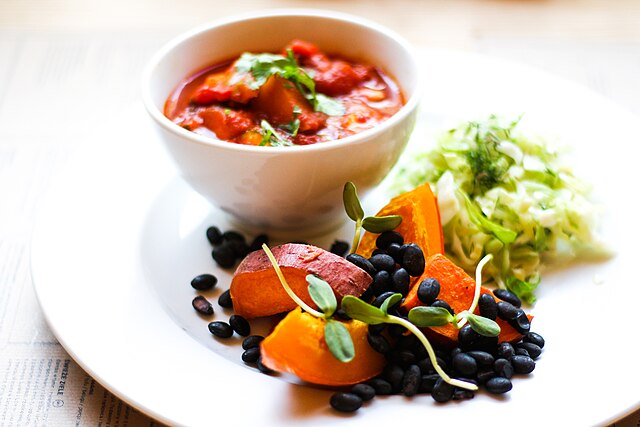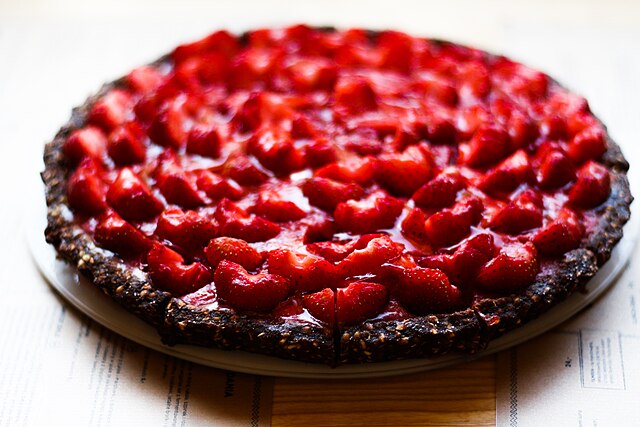
The Thammasat University Library has acquired a new book that should be useful for students interested in food science, sociology, business, nutrition, and related fields.
This Is Vegan Propaganda (And Other Lies the Meat Industry Tells You) is by Ed Winters.
The TU Library collection includes a number of other books about different aspects of veganism.
Veganism is the practice of not using animal products in our diet. There are different kinds of vegans: dietary vegans or strict vegetarians do not consume meat, eggs, dairy products, or other animal-derived substances.
An ethical vegan follows a plant-based diet and also opposes the use of animals for other purposes, trying to avoid cruelty and exploitation of all animals, including humans. Environmental veganism means avoiding animal products because industrial farming of animals is environmentally damaging and unsustainable.
Vegan diets require careful planning to provide sufficient nutrients. The term vegan was first used by the English animal rights advocate Donald Watson in the 1940s, during the Second World War. Widespread interest in veganism began in the 2010s.
This is Vegan Propaganda states that a vegan diet can help resolve the climate crisis, infectious and chronic diseases, and human exploitation.
The author once liked to eat at KFC restaurants, but since choosing a vegan diet, he claims it improves health, fights environmental destruction; and stops mistreatment of animals. He writes: If we want to protect wildlife, the best way to do that is to change what’s on our plates. Every time we eat, we have the power to radically transform the world we live in and simultaneously contribute to addressing many of the most pressing issues that our species currently faces.
Mr. Winters admits that when he became a vegan, his family made fun of his decision. He decided not to attend the celebration of the sixtieth wedding anniversary of his grandparents because he felt that the food that would be served there would exploit animals. So sometimes vegans can feel different from those around them, including family and friends.
He suggests that we should care as much about animals currently used for food as we care about household pets. Animal farmers, he proposes, might be repurposed as crop farmers or publicly funded land managers with current subsidies used for rewilding that land:
That could be regrowing forests, woodlands, wildflower meadows or long grass meadows which are great for pollinators such as bees and other insects and promote biodiversity that is essential.

This vision of ecotourism, agroforestry, and empowering local communities and farmers markets might seem to be a utopia to some observers. Yet Mr. Winters responds:
We are never going to create a perfect utopia, but we should strive to get as close to that as we possibly can, and veganism is one of the first big stepping stones in that direction.
Vegan Propaganda is sometimes harshly critical of people who are not vegan. His moral argument is that we should respect animals on the same level as humans.
Like most books on veganism and vegetarianism, This is Vegan Propaganda describes ways that farm animals and livestock are treated. Veganism is good for the environment, although those who argue against veganism claim that the soy farming industry. which most vegans rely on as a principal source of protein, is not environmentally friendly. This is true, Mr. Winters admits, but he also observes that farm animals are fed more soy than humans consume. In addition, eating animal products has been linked to chronic disease and illness in humans. Becoming vegan is a process that means changing habits and lifestyle.

Here are some thoughts by the UK poet Benjamin Zephaniah about veganism from a 2022 interview posted online:
When I was 11, I had a conversation with my mother. She had beef on the table and I asked: “Where did the beef come from?” She said: ” From the man in the shop.” I asked, ”where did the man in the shop get it from,” She said, “From the man in the van”, so I asked: “Where does the man in the van get it from?” And she said that it came from the man on the farm. So I asked: “Where did the man on the farm get it from?” And she said, from the cow. So I asked: “Where does the cow get it from?” and she said: “You silly boy! It is the cow!” I stopped eating meat right then because it was at that moment I realised that I had never connected the two things… Immediately I pushed the meat away and told my mother: “I’m not eating my friends!” A couple of years later I read about what we do to get milk from animals – the cow’s baby is taken away and she never experiences the joy of raising it – just so that we can have the milk.
Among previous UK poets who have adopted vegetarianism is Percy Bysshe Shelley, author of A Vindication of Natural Diet (1813) about vegetarianism and animal rights.
Shelley wrote four essays on the subject of vegetarianism. He first experimented with a vegetarian diet while at the University of Oxford, according to friends. Shelley began a vegetarian diet on 1 March 1812 along with his first wife Harriet Westbrook.
In the novel Frankenstein; or, The Modern Prometheus (1818), written by Shelley’s wife Mary, the Monster is portrayed as a vegetarian. In Shelley’s The Sensitive Plant, he argued that all life forms have a natural role to play in the ecosystem which requires understanding rather than destruction.
Shelley argued that eating meat was unnatural. He maintained that diseases and immorality arose from mankind’s unnatural habits of life. A meatless diet was the best way to maintain a healthy and disease-free lifestyle, he argued. He wrote that human diseases could be decreased by a return to a natural vegetable diet. In A Vindication of Natural Diet he wrote referring to the consumption of meat, Should ever a physician be born with the genius of [John] Locke, I am persuaded that he might trace all bodily and mental derangements to our unnatural habits.
Shelley also compared a meat diet to alcoholism. He used comparative anatomy to indicate that the human digestive system resembles that of plant-eating animals.
He concluded that a person with compassion and empathy for animals would be able to maintain a healthy and balanced diet and lifestyle. Shelley presented examples of how a vegetarian diet resulted an increased lifespan. The two rules he prescribes for a natural diet were to never eat anything that was alive and to drink only distilled water. Unfortunately, Shelley died at age 29 in a boating accident.

(All images courtesy of Wikimedia Commons)
